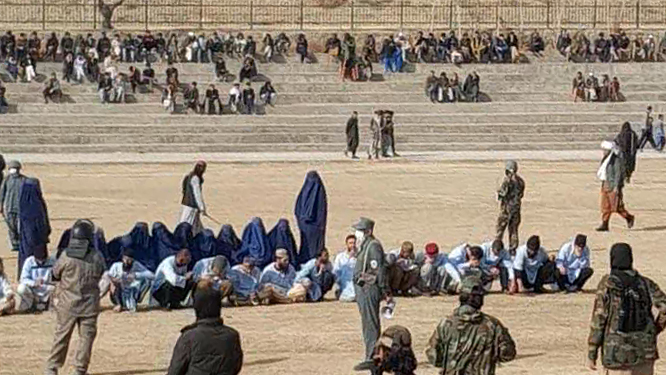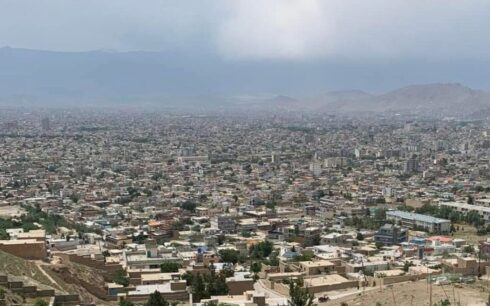KABUL, Afghanistan — Over the past two months, Taliban have publicly flogged at least 96 people, including 13 women, for various offenses, according to data collected by Amu from the Taliban-run Supreme Court statements.
The punishments have been carried out across multiple provinces and come amid widespread international condemnation of the Taliban’s practices of corporal punishment.
Between September 16 and October 15, 47 people, comprising 40 men and seven women, were publicly flogged in 12 provinces, including Herat, Kandahar, Faryab, Laghman, Takhar, and Khost, the data shows.
Another 49 people, including six women, were lashed between August 17 and September 15 in provinces such as Kabul, Balkh, Zabul, Helmand, and Paktika.
According to Taliban statements, the accused faced charges ranging from theft, adultery, and sodomy to running away from home, drug trafficking, and “immoral behavior.”
The number of lashes varied between 19 and 39 per person, with some individuals also receiving prison sentences.
In the latest incident, two men accused of sodomy were lashed publicly in Khost Province on Tuesday, Oct. 15. This brings the total number of people publicly flogged by the Taliban to at least 683, including 119 women, since they regained power in August 2021. These figures highlight the Taliban’s continued use of corporal punishment as a method of law enforcement, despite ongoing global criticism.
Residents of Kabul have expressed fear over the Taliban’s public punishments. Zahra, a Kabul resident who asked to remain anonymous, said, “We cannot go outside freely. They flog women, they mistreat us. We call on the international community to press the Taliban to lift these restrictions.” Ahmad, another resident, echoed her sentiments, urging the international community to intervene: “They are flogging people publicly without any legal procedures. It is inhumane.”
The United Nations and international human rights organizations have repeatedly condemned the Taliban’s corporal punishment practices, urging an end to public floggings. In a recent statement, the United Nations Assistance Mission in Afghanistan (UNAMA) criticized the Taliban’s actions, labeling them as “clear violations of human rights and dignity.”
Activists have voiced concerns that the Taliban’s harsh penalties are an attempt to extend their interpretation of Islamic Sharia law beyond Afghanistan’s borders. “The Taliban’s recent actions have led to human rights abuses against Afghan citizens, and it is essential that the global community takes a firm stand,” said an activist who wished to remain anonymous for security reasons.
In response to the criticism, the Taliban have defended their methods, claiming that the punishments are aligned with Islamic law. However, some Islamic scholars have countered that the Taliban’s practices lack consistency with Islamic principles, arguing that their approach undermines the foundational tenets of justice.
Despite sustained pressure from international bodies, the Taliban have shown little willingness to change their stance. The United Nations and human rights organizations continue to call for a halt to public punishments and a reassessment of Afghanistan’s human rights landscape under Taliban rule. For many Afghans, however, the reality remains unchanged: the Taliban’s enforcement of severe and highly public punishments continues to cast a shadow over everyday life, heightening fears and suppressing freedoms.
The ongoing floggings highlight the growing tension between the Taliban’s governance methods and the expectations of a global community that increasingly calls for accountability and respect for human rights in Afghanistan. As these practices persist, Afghan citizens and activists continue to appeal for international intervention, hoping to see an end to what they describe as violations of their basic rights.





